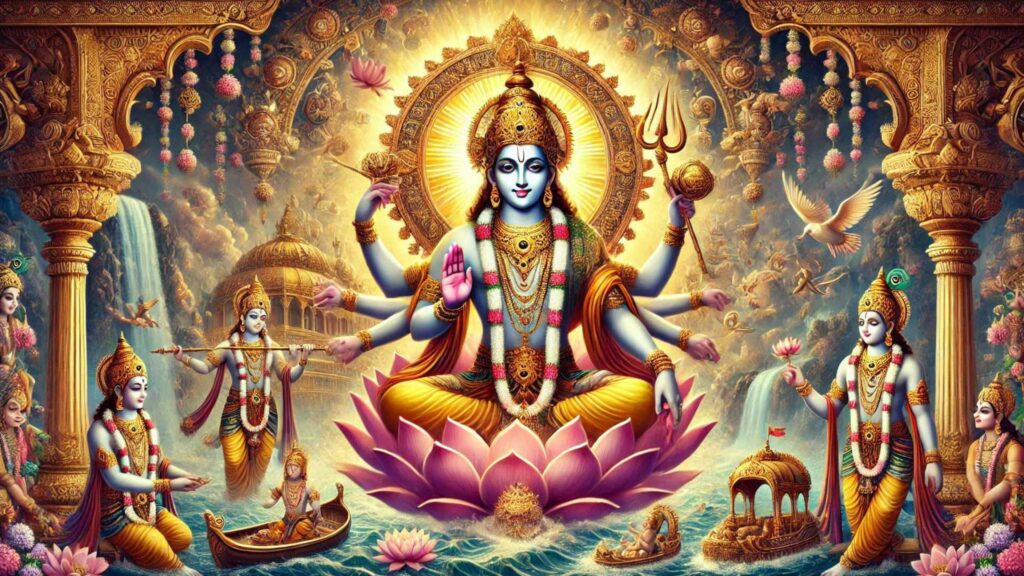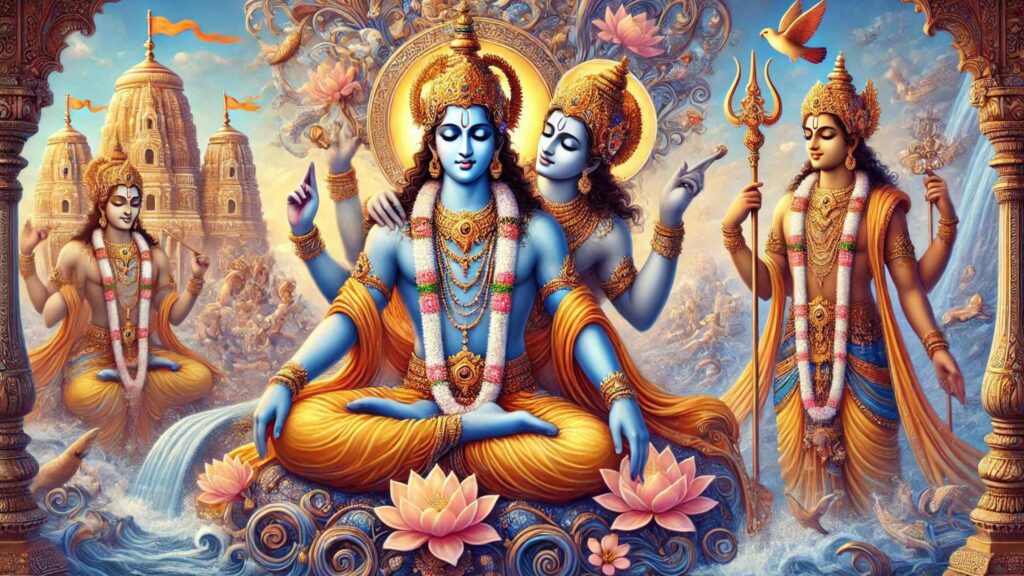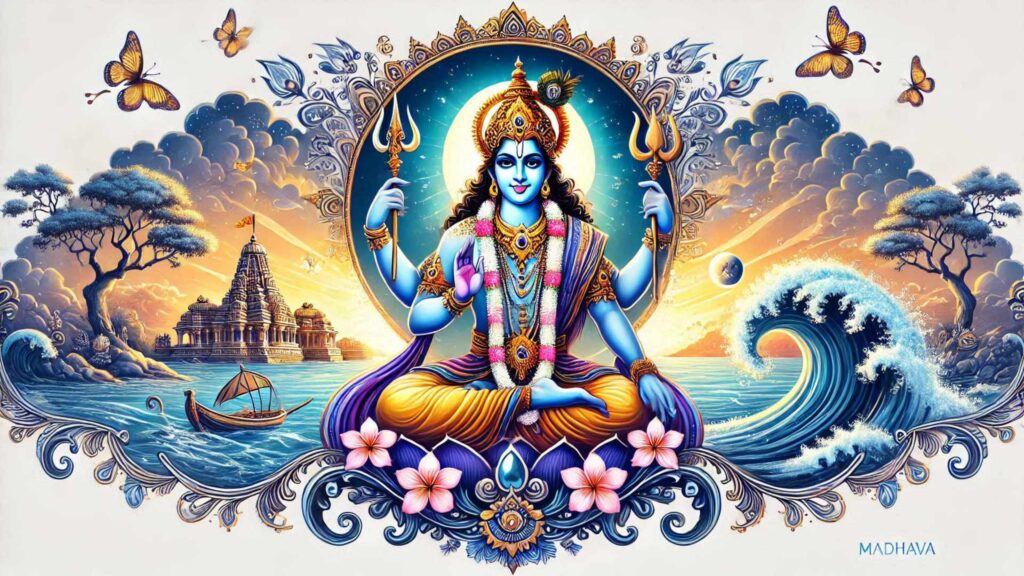Introduction
A Brief Overview of Madhava in Hinduism
Madhava is a revered epithet of Lord Vishnu, the preserver in the Hindu Trimurti, symbolizing divine wisdom, prosperity, and cosmic balance. The name “Madhava” has profound roots in Hindu texts, linking it with both the supreme reality and human devotion. It reflects Vishnu’s role as the nurturer of the universe and a source of spiritual enlightenment.
Read More About Deities And Gods
Significance in Daily Hindu Life
Madhava’s influence permeates the daily lives of Hindus. Whether through morning prayers or grand temple rituals, invoking Madhava fosters harmony, prosperity, and spiritual clarity. His blessings are believed to bring peace and dispel ignorance.
Cosmic and Spiritual Importance
Madhava represents the eternal essence of Sat-Chit-Ananda (truth, consciousness, and bliss). As a symbol of preservation, he maintains the universe’s rhythm, embodying love and balance. In spiritual practices, Madhava is a guide toward liberation (moksha), emphasizing the interconnectedness of life and the divine.
Names and Etymology

Meaning of Madhava
The name “Madhava” has dual interpretations:
- “Ma” (Lakshmi) and “Dhava” (husband) – Referring to Vishnu as the consort of Lakshmi.
- “Madhu” (nectar or sweetness) – Denoting Vishnu as the embodiment of divine sweetness and bliss.
Other Names and Their Significance
- Keshava: Destroyer of Kesi, symbolizing the removal of ignorance.
- Govinda: Protector of cows, reflecting care and nourishment.
- Narayana: The eternal refuge of beings.
- Hari: The remover of sins and afflictions.
- Vaikunthapati: Lord of Vaikuntha, the divine abode.
Symbolism and Iconography

Physical Description and Meaning
Madhava is often depicted with:
- Four arms: Holding a conch (shankha), discus (chakra), mace (gada), and lotus (padma), representing creation, protection, power, and purity.
- Crown and ornaments: Signifying sovereignty and divine authority.
- Blue complexion: Symbolizing infinity and cosmic depth.
The Symbolism of Madhava
- The Conch (Shankha): Sound of the universe and awakening.
- The Chakra: Protection and justice.
- The Mace (Gada): Strength and determination.
- The Lotus (Padma): Purity and transcendence.
Flower Connection
The lotus flower, often associated with Madhava, signifies purity and spiritual awakening, growing untouched in muddy waters.
Colors and Symbols
- Blue: Infinite nature and serenity.
- Yellow garments: Earthly presence and divinity.
- Garlands of tulsi (holy basil): Sacredness and devotion.
Mythology and Stories

Birth Story
As an aspect of Vishnu, Madhava’s origins are tied to Vishnu’s cosmic role. Born as the sustainer of the universe, his stories reflect preservation and nurturing.
Connection with Spouses
Madhava is eternally associated with Goddess Lakshmi, symbolizing wealth, fortune, and prosperity.
Role in Ramayana and Mahabharata
- Ramayana: As Vishnu, Madhava’s essence is present in Lord Rama’s righteous rule.
- Mahabharata: Krishna, an avatar of Vishnu, is frequently referred to as Madhava. His guidance to Arjuna in the Bhagavad Gita epitomizes spiritual wisdom.
Famous Blessings and Boons
Devotees believe invoking Madhava can grant moksha, eradicate ignorance, and fulfill righteous desires.
Spiritual Significance
Visible Form of God
Madhava’s form symbolizes divine protection, wisdom, and love. His serene visage inspires devotion and inner peace.
Representation of Knowledge and Enlightenment
Madhava signifies the eternal light of wisdom, guiding humanity toward liberation through dharma (righteousness).
Connection to Yoga and Meditation
In yoga, invoking Madhava balances the mind and connects the practitioner to higher consciousness. He represents Sahasrara (crown chakra), fostering enlightenment.
Worship and Rituals
Benefits of Worship
Devotees experience:
- Mental clarity.
- Spiritual strength.
- Material and spiritual prosperity.
Daily Worship Practices
- Recitation of “Om Namo Bhagavate Vasudevaya”.
- Offering tulsi leaves, flowers, and sweet dishes.
Best Times for Worship
- Thursdays and Ekadashi days.
- Early morning hours (Brahma Muhurta).
Important Festivals
- Vaikuntha Ekadashi: Celebrating liberation.
- Janmashtami: Krishna’s birth.
- Diwali: Associated with Lakshmi and Vishnu.
List of Famous Temples
- Sri Venkateswara Temple (Tirupati, Andhra Pradesh).
- Padmanabhaswamy Temple (Kerala).
- Jagannath Temple (Puri, Odisha).
Modern Relevance
Scientific Understanding
- Worship of Madhava fosters mindfulness and stress relief.
- Tulsi’s role in rituals has proven health benefits.
Environmental Consciousness
The worship of Vishnu as Madhava emphasizes harmony with nature, promoting sustainability.
Health Benefits and Energy Connection
Chanting Vishnu mantras calms the mind, harmonizes bodily energies, and reduces anxiety.
Sustainable Living Practices
Madhava’s principles inspire eco-friendly living through respect for all creation.
Cultural Impact
Influence on Indian Art and Architecture
Madhava is a central theme in temple architecture and sculptures, depicting his cosmic role.
Presence in Literature and Poetry
Texts like the Bhagavad Gita and Vishnu Purana extol his virtues.
Impact on Daily Customs
From marriage rituals to naming ceremonies, Madhava’s blessings are invoked for auspicious beginnings.
Practical Applications
Morning Prayers and Rituals
Start the day with prayers to Madhava to foster positivity and clarity.
Astrological Significance
- Associated with Pisces and Sagittarius.
- Gemstones: Yellow sapphire.
Conclusion
Summary
Madhava encapsulates the essence of balance, prosperity, and spiritual awakening. As a symbol of divine love, he continues to inspire millions toward a harmonious and enlightened existence.
Universal Message
Madhava’s teachings emphasize love, justice, and unity, offering a timeless guide for humanity’s progress.
Call to Action
Explore Madhava’s wisdom in daily life to achieve spiritual and material harmony.
